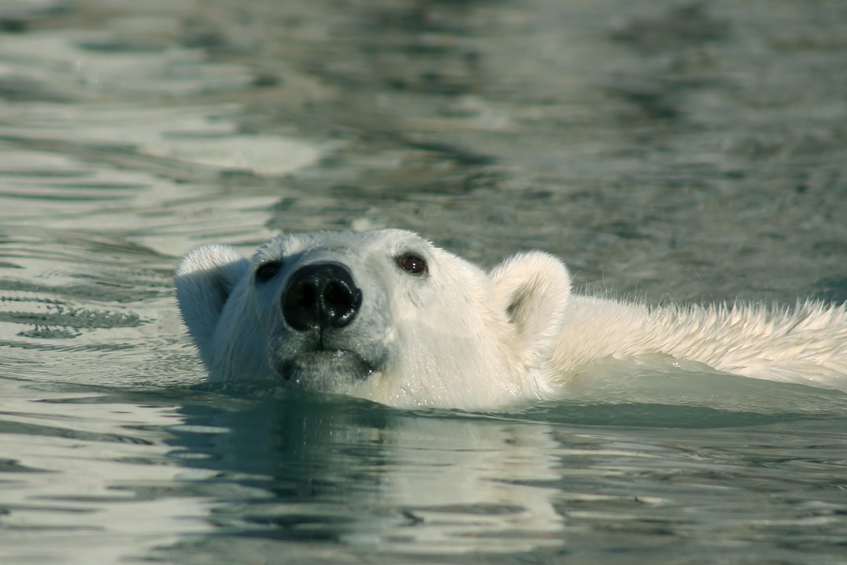First let me set the scene. Alaska’s Arctic Ocean is vast, even as oceans go. During the summer months, Arctic waters lap up against pebble-lined shores for miles along endless miles. In the winter, that water stops lapping because it turns into ice that is so beautiful and important to the Inupiat Eskimo people, who have lived along its shores for thousands of years, that their language contain close to 100 words to describe it. These people hunt and revere the wondrous creatures that make the Arctic Ocean their home — polar bears, ice seals, walrus, various types of whales — including the bowhead whale, the mainstay of the Inupiat diet, that can live to be 200 years old. It is a world made beautiful, treacherous and bountiful by ice, and today, that ice is melting.
Now picture oil rigs. And roads, and airports, and big ships, and pipelines — where there currently are none. Soon after, picture oil spills (remember those images of the scores of wildlife killed by the Exxon Valdez?) that we lack the technical ability to clean up in the Arctic’s harsh, icy conditions. Not a pretty picture.
Today’s offshore drilling announcement by the Obama administration both preserves that first pristine picture and brings us closer to the dirty, devastating one. Confused? Let me explain.
The Arctic has been open to oil and gas drilling for many years, but for much of that time the oil companies decided it was too expensive to develop there. That changed with the Bush administration, higher gas prices, and dwindling supplies of oil. In the current five-year plan (2007-2012), close to 75 million acres were opened to leasing in the Arctic’s Chukchi and Beaufort Seas. Of that, 2.8 million acres are currently under lease in prime hunting waters for Alaska’s Inupiat people. The rest were just taken off the table by the Obama administration — for now.
They could be put back up for lease as early as 2013, after the Department of Interior conducts two levels of intensive scientific study, because while we know there are polar bears, walrus, whales, ice seals, and millions of migratory birds, we don’t know much more. The Arctic is the least studied area on Earth, according to the U.S. Arctic Research Commission. And many Alaska Native groups and conservation groups have said that until there is more information and until the technology exists to clean up oil spills in those far northern waters, there should be no plans for drilling. Today, the Obama administration seemed to agree.
They did this in part because a federal court (in response to a lawsuit filed by the Native Village of Point Hope, Alaska Wilderness League, Pacific Environment, and Center for Biological Diversity) told them a year ago that the environmental analysis prepared by the Bush administration that allowed the 2007-2012 drilling plan to go forward was deeply flawed (it analyzed coastal areas as opposed to offshore areas where the drilling would actually occur). The court ordered the Obama administration to do a whole new environmental analysis, which they released today, and which they used to say that the Chukchi and Beaufort Seas are highly sensitive areas that need to be studied before they can be drilled.
So, today, the Obama administration seemed to reverse the egregious wrongs of the Bush administration. That is, until it comes to the 2.8 million acres currently under lease that Shell Oil and others are chomping at the bit to develop. They are hoping to move their 514-foot-long drill ship and fleet of support vessels and aircraft into the Inupiat’s pristine Arctic waters as soon as this summer. And today, the Obama administration said that was fine with them.
We’re not talking about two different oceans here or two different environmental analyses. Nope. We’re just talking about two different standards being applied. So what does this all mean for Arctic Alaska? Hopefully, the courts will do what the Obama administration did not and ensure that the same standard that the Obama administration applied to the future lease sales in the Chukchi and Beaufort Seas will be applied to the completed lease sale in the Chukchi Sea. We’re in the midst of a few lawsuits right now that are taking up that fight.
We won’t rest until that pristine picture is preserved. And the Inupiat Eskimos can keep their ice and the centuries-old way of life that comes with it.



